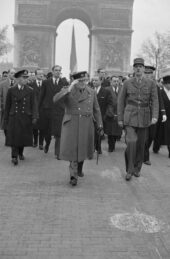1920 Odessa Ukraine. The Russian Civil War is at its height, a young British man working for Naval Intelligence picks up a report from one of his agents. The crew of the Russian submarine OUTKA are going to mutiny and throw their officers overboard. He leads a party of White Russian intelligence officers onboard and after a short altercation, arrests the culprits and prevents the mutiny. For this action he was awarded the MBE, to add to his two Mentions in Despatches for his intelligence work. This young man was Wilfred ‘Biffy’ Dunderdale. Born in Odessa on Christmas Eve 1899, he was destined from the outset for the world of intelligence. Engaged by Naval Intelligence aged 18 as an interpreter on account of his language skills – English, Russian, French, Polish and German, he would grow into everyone’s image of a buccaneering member of the British Secret Intelligence Service, in a career spanning forty years which Biffy described as “40 years of licenced thuggery”.
He soon proved his worth to Naval Intelligence as an effective agent runner. He had grown up in the dangerous and cosmopolitan port city of Odessa, where he made many friends and contacts. His nickname ‘Biffy’ proved he was not afraid of a scrap.
He had an early exposure to the world of international intrigue when at age 16 he was sent by his father to oversee the movement of American submarines by train across Russia from Vladivostok to St. Petersburg. It was on this journey that he found himself in the corridor of the train translating for a Russian General who was seducing his English aristocratic mistress until verbal direction ceased to be relevant.
Studying Naval Architecture in St. Petersburg on the outbreak of the Russian Revolution, he made his way home to Odessa. He proved to have a natural flair for clandestine work, quickly earning praise from the highest levels of British Intelligence. He quickly caught the attention of the Secret Intelligence Service and was recruited in 1921. He was sent to Constantinople where he oversaw the departure of the Sultan, paying off the ladies of his Harem with gold sovereigns. He continued his anti-Bolshevik operations, working closely with the White Russian émigré community but being fully aware of their vulnerabilities. In addition he was able to completely penetrate the Turkish Nationalist movement, and pioneered the use of wireless intercept and technical intelligence operations.
At the very young age of 26 he was charged with setting up a new SIS Station in Paris to continue to work with his émigré friends but also to develop close relations with the French Intelligence Services. This he did with great success against the backdrop of Paris in ‘Les Années Folles’. Biffy slotted into the hedonistic atmosphere, hiding in plain sight as a wealthy ‘bon viveur’. He rubbed shoulders with the rich, famous and exotic – the Russian aristocracy, the Rothschilds, the Windsors, Cole Porter, Josephine Baker and many assorted characters who he would co-opt into his world of intelligence. He was regularly seen at Maxims, Ciro’s, the haunts of Montparnasse and in nightclubs such as Sheherazade. He and his very glamorous wife June were the toast of ‘Le Tout, Paris’.
Behind the glitz and glamour worked a razor-sharp mind. One of his main jobs was to work closely with the French Deuxième Bureau, dealing with defectors, traitors and the rising threat from Nazi Germany. The French liked and respected him.
In the late 1930’s he helped foster relations between the British, French and Polish Cryptanalyst Services, who were working on cracking the ENIGMA coding machine, Biffy facilitated a meeting in Warsaw which culminated in the Poles providing the British and French with an ENIGMA each. Biffy and his team spirited the machine from Paris to London on the Golden Arrow, an adventure which would form the basis of Ian Fleming’s ‘From Russia with Love’. The ENIGMA arrived in London two weeks before the outbreak of war. This was one of Biffy’s greatest achievements although he played it down in later life.
Leaving Paris in 1940 in a hurry in the face of the rapid German attack, he withdrew his SIS team to Bordeaux where they were evacuated in the nick of time. Biffy himself was ordered by ‘C’ Sir Stewart Menzies, Head of SIS, not to be captured at any cost and a plane was sent to get him out. Within a very short space of time Biffy had agents back in France setting up networks to gather strategic intelligence on the U-Boat threat, coastal defences and Hitlers secret weapons.
He maintained contact with his Vichy friends who had agreed to continue working with the Allies in spite of being seen as part of the collaborationist Vichy government. He also ran networks in occupied France the most successful of which was called JADE AMICOL, which survived from 1941 until the Liberation of France. His responsibilities also included working very successfully with the Polish Intelligence Service.
After the war Biffy was appointed ‘Controler Special Liaison’ – a wide ranging remit which included running networks, intercept operations, guerrilla warfare and being assosciated with skulduggery of all sorts, including the Suez Operation and the Buster Crabb affair.
Winds of change swept through SIS after their ‘Annus Horribilis’ of 1956. Biffy’s style of buccaneering approach to the Cold War – and that of his fellow ‘Robber Barons’ was deemed too dangerous. But Biffy survived the changes and retired as planned in 1959, although there was some speculation that he continued his work for SIS after his ‘retirement’.
I describe Biffy as more ‘Bond than Smiley’ and he is often touted as the role model for Bond. He was a lifelong friend of Ian Fleming and there is some truth in this which is examined at the end of this book. He was certainly the ‘consultant’ behind ‘From Russia with Love’.
‘A Suspicion of Spies’ is the intriguing story of an extraordinary man – suave, sophisticated, genial and rich but also a ruthless and effective spymaster. His career spanned the Russian Revolution to the Cold War and beyond. Biffy died in New York in 1991, a year after Saddam Hussein invaded Kuwait.
It is the story of the complicated intrigues of the world of intelligence. It is what the British are good at and Biffy was one of the best.
Tim Spicer is a historian and the author of A Suspicion of Spies: Risk, Secrets and Shadows – the Biography of Wilfred ‘Biffy’ Dunderdale.







